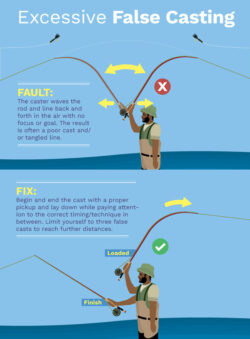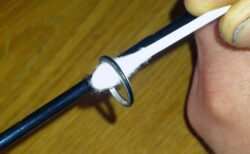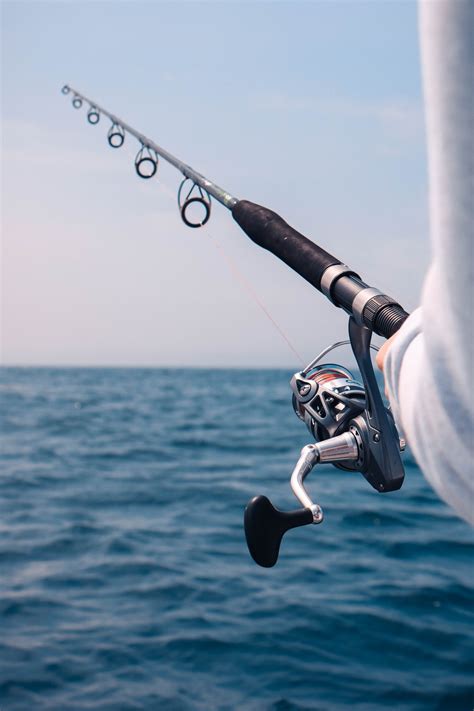Sometimes an angler must cast a really long way. Perhaps they just saw a huge fish surface, or closer casts tended to spook the fish. Maybe the structure or edge of a weed bed is further out. Not only might they need longer range, but the cast also needs to be accurate.
Most fly fishing is within shorter distances. The actual fly line on the reel is only 30 yards long. The leader may be 9 feet. The backing is often 50 or more yards. Most of the casting power happens in the front half of the fly line and leader. This is why a double taper line is so practical. After a season of use, you can reverse the line on the reel and start with an almost new line.
When a fly fisherman casts, they are basically throwing a rope, not casting a fly. The fly is so light that it will not pull any line. The line is thrown, and the fly goes along for the ride.
Spin fishermen also want to make longer casts. In this case, the lure or bait will be pulling line off of the reel. The heavier weight will help determine the range. If the spinning bait or lure is small, distance will be less.
So how can you make your gear cast further?
Fly Casting Technique is a big part of fly casting. Even if you perform a double haul cast, you must wait for all of the line to sail behind you, and load the rod, before you power the line forward. YouTube videos are great instructional tools. Practice makes perfect.
You can tweak your line and gear to gain distance. Clean your fly line. Now coat it with Armor All, or the manufacturers recommended dressing. The line will become smooth, and slide more easily, through the guides. Eliminate any loops or memory in the line by hanging it outside until limp. A little tug will also work out any loops. Do the same with the leaders. Inspect the rods guides for any nicks or grooves. Smooth them out or replace them. Now clean and lightly wax the entire rod and guides.
You can also “change up” the line weight. Just because the rod says, “5 weight”, it does not mean you can’t cast a 6-weight line. The heavier line will allow for longer casts. A wind cutter or weight forward line will also increase cast distance.
Spin Casting Technique is also important when spin casting. Longer rods will cast further than shorter rods. Lighter lines will go further than heavier line. Newer line, that is of a better quality, will also travel further. Again, make sure to remove any memory from the line. Loops will slow the line moving through the guides. You can spray line dressings on loopy line or simply add a little tension to remove loops.
Check your guides for damage, alignment, and nicks/grooves. A Q-tip is a great way to check for nicks or polish the guides. Any cotton that hits a nick will pull away. Clean the rod and guides, then wax them. 
Timing is important when making any cast. The rod is a lever. It must move forward and backwards completely to get maximum power from them. There are also little tricks to help increase distance. Only allow 12-16 inches of spin line between the rod tip and lure. Shorter or longer lengths will lose energy. Let the rod do the work. The longer the lever, the more work it can do. Ultra-light spin rods or shorter/ lighter fly rods restrict distance. They may have their place when fishing in smaller, tighter, or more technical places, but distance is not their strength. Taking a running start or steps to cast further is a waste of energy. If you release the cast too soon, you will create a high arc. If you release too late the cast will go too straight and die quickly.
If you can’t cast further, get closer. Stalk the fish. Fish upstream so the fish can’t see you. Step softly so the fish can’t feel you. Get lower to reduce your presence. Watch your shadow. Wear camo clothes that match your fishing area. Think about what the fish sees. The sky is blue or cloudy. Trees are brown and green, etc.
When the cast is complete, your rod tip should be facing your target. If the tip is higher or lower, you are losing energy and accuracy. Fly fishermen often slap their line onto the water, scaring the fish. Keep the tip at 9 o’clock.
Experienced casters are better long-distance casters. Practice to improve. Eventually, casting will become second nature.
Montana Grant
Join Montana Grant on his Facebook Group at Montana Fishing For Fun!



